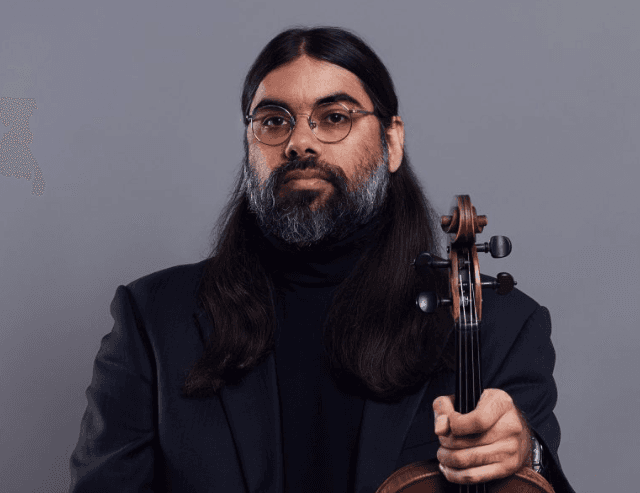The coming dawn

Aaron Wyatt, Australian (Noongar) composer (Image: Jessica Bader Photography)
Aaron is an accomplished violist who - before moving to Melbourne - was a regular casual with the West Australian Symphony Orchestra.
He has played in a wide variety of ensembles across numerous genres, and has toured internationally with the award-winning Decibel New Music ensemble.
As well as performing with the ensemble, Aaron is the developer behind the Decibel ScorePlayer app, the group’s cutting edge, animated graphic notation software for iPad.
An emerging conductor, Aaron was nominated for a Helpmann Award for his role as musical director of the premiere season of Cat Hope’s opera, Speechless, at the 2019 Perth International Arts Festival.
He has recently become the director of Ensemble Dutala, Australia’s first Indigenous classical chamber ensemble.
Aaron premiered Deborah Cheetham Fraillon’s work, Nanyubak, for viola and orchestra as a soloist with the Melbourne Symphony Orchestra (MSO), before going on to conduct the MSO: becoming the first Indigenous Australian to conduct a state symphony orchestra in concert.
As a composer, Aaron has been a participant in the Ngarra-Burria First Peoples Composers program, writing for Ensemble Offspring. He has also written a number of electro-acoustic works, using a mix of traditional and animated graphic notation, for Decibel, GreyWing Ensemble and Ensemble Dutala.
Aaron Wyatt (B. 1983)
The Coming Dawn
World premiere, new CSO commission
The Coming Dawn began life as an exploration of the interplay between didgeridoo/yidaki and string quartet (with the added colour of the vibraphone). It was only during the writing process that the title and theme of the work started to slowly emerge from the music.
To me, the introduction suggests the stillness of night in the early hours before sunrise; the vibraphone, the sparkling of the stars above; the drones in the strings, the earth below. With the entry of the didgeridoo, the driving rhythms in the ensemble speak to the ruggedness of the landscape, and to the memory of all who have ventured across it.
As minor turns to major (well, technically Lydian) the didgeridoo has a chance to solo beneath a slow, drawn-out melody in the vibraphone, while clear string harmonics begin to sound. The didgeridoo fades, and these harmonics shine out as the very first light of dawn, casting gold, orange, and red hues across the landscape.
As the music builds, interjections in the first violin become vaguely reminiscent of bird calls, until a dramatic key change brings about sunrise itself. Throughout the piece, the harmonies have been built firmly around the drone of the didgeridoo, but here they abandon it. The didgeridoo becomes a dissonance, no longer at home in the new key of the string quartet, in a move vaguely reminiscent of the final moments of Strauss’ Also sprach Zarathustra.
Just as in the Strauss, it is this semitone dissonance that gets the final word, the tension between the strings and didgeridoo left unresolved.
© Aaron Wyatt, 2023
